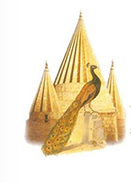There is a major debate on what the correct label for the Yezidi language is and some of it is motivated by politics . Yezidis from Basheeq and Bahzan towns in Iraq speak Aramaic/Arabic as their mother tongue. The rest of Yezidis speak a language they have labeled Kurmanji or Ezidiki/Kurdish. Yezidis International identify it as Kurmanji which is a language spoken by many Kurds and Yezidis alike.
While many are quick to point at Yezidis as Kurdish speaking, linguists have shown that what is called “dialects” of Kurdish language are as different as Spanish and German. It is incorrect to say Yezidis speak Kurdish. Saying someone speak Kurdish is a very vague term and those who speak Kurmanji are unable to comprehend Sorani or Horami (the other dialects of Kurdish).
The terms below are some common terms used by Kurmanji speaking Yezidis.
Glossary of Common words
- Agha A tribal leader or landowner among Kurds
- Ashori Assyrians
- Baba Jawesh Senior clergyman at Lalish
- Beba Sheikh It literally means “Father” Sheikh. He is the spiritual head of the Yezidis
- Beri Milkmaid
- Barat Small balls made of earth from the sanctuary of Sheikh Adi and the water of the Zemzem spring. They are regarded as sacred and are distributed to the pilgrims at the time of the festivals.
- Bokhchk
- Chajna religious festival/holiday
- Diwan Village guest house
- Faqir
- Ftwa Islamic ruling
- Gholam Servent/slave
- Hevi Hope
- Jihad Holy war where the goal by Muslims was to get others out of the Muslim land.
- Kani Spring. A place where subsoil water rises and flows on the surface of the ground.
- Khatuna Fakhran A female figure. She came from a branch of the Shamsani family and is believed to have lived in the thirteenth century. She was the daughter of Sheikh Fakhr al-Din, wife of Hasan Jelle and sister of Sheikh Mand Pasha.
- Khirqa a kind of tunic worn by religious men (feqirs). According to sufis, the khirqa is the most appropriate form of religious dress, derived from the prototypical costume worn by Adam and Eve when they were placed upon the earth.
- Khoda God
- Kiriv The “guardian of the child”. He is a kind of godfather who takes care of the child during circumcision.
- Kochek Far-seer. is a servent of Lalish, but also sees into far away
- Kolav Carpet to sit on
- Kurmanji A Kurdish dialect, spoken north of the Greater Zab River.
- Lalish Noorani “Serene” or “sacred” Lalish. Lalish, in Iraq’s northern Kurdish mountains, is to the Yezidis what Jerusalem is to followers of the three great monotheistic faiths: Islam, Christianity, and Judaism.
- Malah Clerical in Sunni Islam
- Mezn et Ma Leaders
- Millet An ethnic group
- Mir A leader of a principality. Prince, commander, ruler
- Murid The layman
- Pasha
- Palas Woven carpet
- Peshteeg A yellow sash used to be worn by the elderly women
- Qewel Hymns
- Qewal Religious singers. they are responsible for passing down the hymns and prayers.They mostly live in Bashiq and Bahzana
- Qubba Dome
- Sahaba Angel
- Sere Sal New Year
- Shahada The declaration that there is only one God and Mohammed is his last prophet
- Sharia The Muslim code, a legal system based on Quran
- Shermi Shame
- Sheikh Head the Arab tribe
- Sheikh a Sheikh Mend a lineage of sheikhs able to handle snakes. This ability is ascribed to their family
- Sinjaq
- Techmh It’s when the Yezidis were forced into “collective villages” from the mountains. Muslims were moved to live among them and mosques were built in their area, too.
- Wilayat State or Province
- ZemZem The holy spring in Lalish
- Zardashty In English known as Zoroastrianism. Religious movement reformed by Zoroaster between 1700-1000 BC Perhaps in Balkh, but taking as its base a much older Iranian religion as is expressed in Zend-Avesta. The name derives from the supreme god of the Good,




